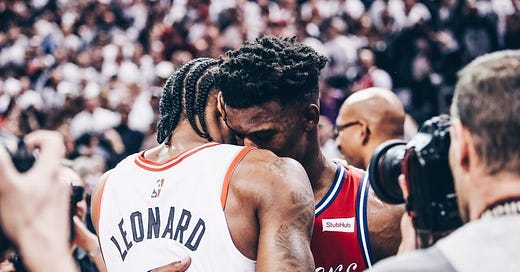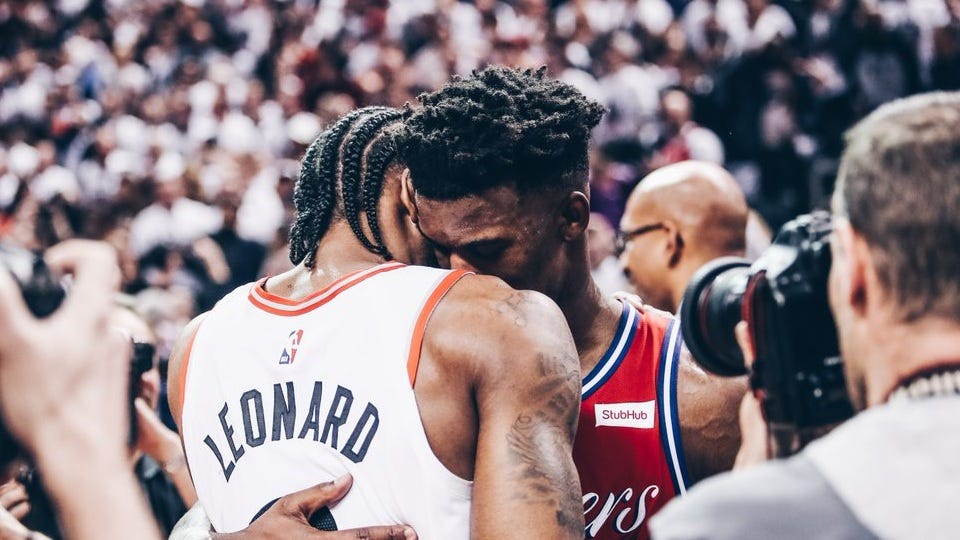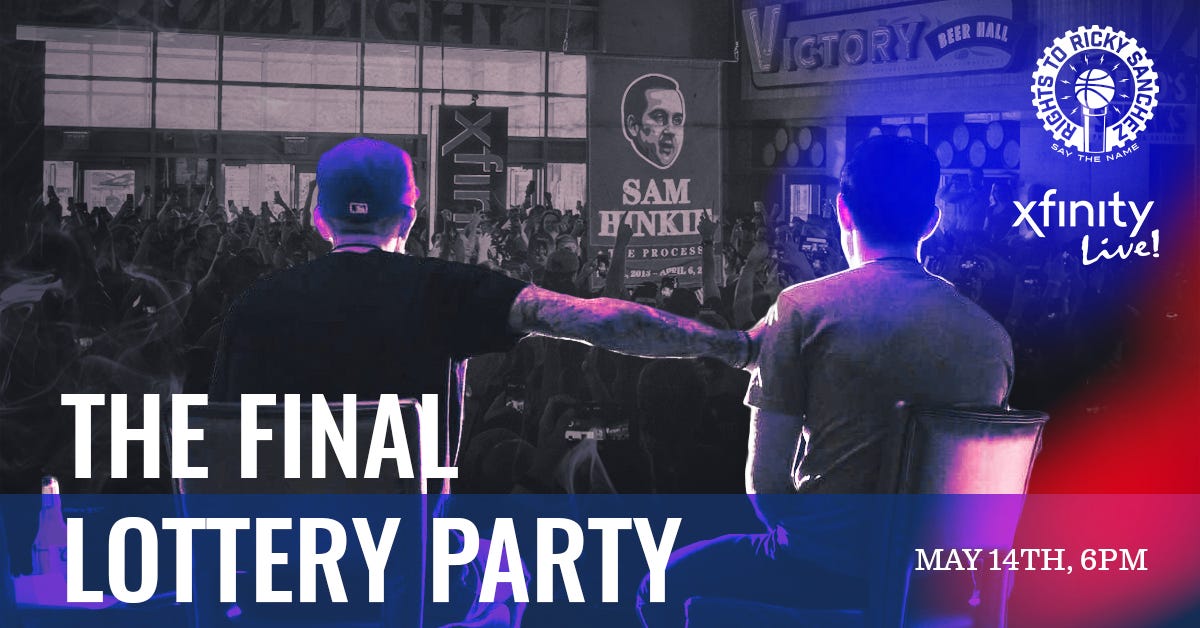Sports Has to Be About More Than Whether or Not the Shot Bounces In
Is there more to sports than winning and losing?
Andrew Unterberger is a famous writer who invented the nickname 'Sauce Castillo' and is now writing for The Rights To Ricky Sanchez, as part of the 'If Not, Pick Will Convey As Two Second-Rounders' section of the site. You can follow Andrew on Twitter @AUGetoffmygold and can also read him at Billboard.
Andrew's writing is brought to you by Kinetic Skateboarding! Not only the Ricky's approved skate shop, but the best place to get Chucks, Vans, any apparel. Use code "DAVESILVER" for 9.1% off your order.
In 2001, the 76ers were on the verge of disaster in Game 7 of the Eastern Conference Semifinals. Hosting the deciding contest against the fifth-seeded Toronto Raptors, the Sixers were up four with the ball and just over a minute to go, game seemingly in hand. But a sprawling Allen Iverson turnover led to a Toronto runout and Dell Curry three at the other end, cutting the lead to one. Two fruitless Sixers possessions later, the Raptors had the ball with 2.0 seconds to go, and inbounded to All-Star Vince Carter on the right wing, who briefly froze to shed a lunging Tyrone Hill, and then hoisted a 20-footer. It bounced off the rim.
If that shot landed in the basket, the Raptors win the series. Iverson’s entire Sixers legacy is different -- no finals appearance, no 44-point closeout against the Bucks in Game 7 the Eastern Finals, no Tyronn Lue stepover. Maybe that’s Carter’s finals run instead, and maybe the two essentially swap places in NBA history as a result. Maybe fans point to Iverson’s 8-27 shooting night and his turnover and terrible jumper in the final minute-plus as proof that he’s not clutch, not a winner. Maybe he demands a trade a couple years earlier, and maybe The Process moves up a half-decade in timeline as a result -- or maybe it just never happens at all.
Last night, the Raptors again had a shot to win the series against the Sixers in a Game Seven -- though this time it was in Toronto, this time the score was only tied, and this time they were the favorites going into the series. Kawhi Leonard actually didn’t even get as good a look as Vince Carter got 18 years earlier: an off-balance fadeaway in the corner, with Joel Embiid, the best big-man defender in the NBA, draped all over him. Unsurprisingly, it also bounced off the rim. But of course, this one bounced straight up, drifted away and then back, and after a couple caroms between one far side of the rim and the other, settled into the cylinder and dropped through. Raptors win. Sixers season over.
The gut-punch of it was, of course, very real and very merciless. The Sixers had been down three with 24 seconds to go, and with points coming at such a premium in the ‘90s-style slugfest, three seemed like a lot of ground to make up in such a short period of time. But a couple clutch Embiid free throws, a Kawhi FT miss, and a Jimmy Butler gallop down the court for a bucket to tie it, and it seemed we might actually be headed to OT against a Raps squad already mentally gameplanning against Giannis. It could’ve been one of the great comeback wins in Sixers history. Instead, it was basically Confetti Game II: Belinelli Boogaloo.
However, I’ve seen some calling it the most painful way that the Sixers could have lost. I disagree. To me, a truly painful loss is Game Five. Maybe not in the moment, since those blowouts are the games you tend to be able to mentally check out of early, make peace with sometime in the third quarter, and move on from in your life by the time the buzzer ends the fourth. But in terms of long-term suffering, give me the fluky buzzer-beaters any day -- when you look back at your season-ending loss months down the road, it’s much nicer to be able to say the Gods of carbon steel weren’t on our side than to say we were beat by 38 and it wasn’t even that close. Painful losses are the ones where you look back and say we never had a chance. Painful losses are the ones where you look back and say we just weren’t good enough.
The Sixers were good enough in this series. In fact, Game Seven was a microcosm of the entire matchup, proving what we really should’ve known all along: These two teams are basically exactly as good as one another. They both won big twice and small once in this series. Both lost a game they could’ve won and won a game they could’ve lost. Both had role players neutralized and thin benches exposed. Their biggest star shone brighter than ours, obviously, but both teams were equally unable to function at length without either on the court. Last night, the score was within five at the end of every quarter. If this series had been first-to-14, we’d probably still be playing a winner-takes-all Game 27 in a month or so.
So what advantage put the Raptors over the top in this series? Maybe it was home court. Maybe it was the transcendent brilliance of Kawhi, certainly the most accomplished player in the series. Maybe it was the Raptors’ greater overall playoff experience, with nearly all of their rotation players having at least made a conference finals before, something none of the eight players who saw the court for Philly last night could claim (save Greg Monroe and his combined half-hour of garbage time last year with Boston). Or maybe it was just as simple as sometimes, the ball bounces your way. Couldn’t say the Raptors weren’t due for that one.
Conversely, for losing teams, sometimes it’s as simple as Better Luck Next Year. Which isn’t to say the Sixers don’t have many areas of improvement to focus on: Embiid’s outside shooting and general conditioning, Simmons’ post-up game and mid-range (any-range?) jumper, a coherent team perimeter defense for 82+ games and a bench rotation that includes a backup center that can play at least 90 seconds in a half without Brett needing to pull the fire alarm among them. But this wasn’t like last year's second round, where an undermanned Celtics squad got the better of Philly down the stretch every time and you had to wonder how things were ever going to look different in future postseasons. If we brought this same core back next year to face the Raps again -- another year older, and perhaps not even with their Finals MVP in tow -- you’d feel pretty damn good about our chances.
But that, of course, is what does make this loss pretty hard to stomach: There’s no guarantee this same core comes back next year. Pretty much everyone besides Embiid and Simmons is a free agent, and while those two guys are still what matters most to the future of the franchise, this postseason has shown they’re pretty far away from being able to do it entirely on their own. Re-signing Jimmy Butler, once a legitimate debate, is now an undeniable priority; give him whatever he wants. Tobias Harris and J.J. Redick are less indispensable but still important pieces not easily replaced within our financial constraints; if they’ll come back for amounts not entirely unreasonable we should probably have them. Same perhaps with Mike Scott and James Ennis III, nomadic NBA types who have now seemingly found their place in the sun in Philly. Return that top seven with a couple smart veteran signings, a solid draft and concentrated development of Zhaire Smith and Jonah Bolden, and the Sixers are absolutely a finals contender next year in the East.
Not likely, however, that it’ll be that simple. Redick, 35, may want a cashout contract before he gets too old to demand one. Ennis and Scott could try to parlay their strong postseason showings into mid-level deals elsewhere. Unlikely any team saw Harris playing the strong-but-unspectacular fourth option for Philly this postseason and determined that he’s the guy to bet the franchise on, but there’ll be a lot of money out there this offseason and not enough worthy players to give it to; it’s possible one of them gives him more than we can stomach matching. Butler seems like a good bet to come back for the max contract he earned, but that dude’s true NBA motivations have long remained a mystery, and predicting him to act predictably feels foolish. And of course, hanging over all of it is the commitment of ownership, who will have to shell out the beaucoupiest of bucks to keep the entire squad together, something they’re reportedly willing to do, but something NBA fans have learned to never count on happening until it actually happens.
And then, you get to the biggest question, the one hanging over the Sixers fanbase all weekend leading up to Sunday night’s Game Seven: Have the Powers That Be already decided that Brett Brown isn’t the coach to lead this team? Brett’s Game Seven performance was, like most of his players, flawed but gutsy: He couldn’t get the Sixers a clean look down the stretch when they really needed one, but it’s hard to say how much of that is on the coach for not drawing up better actions, how much is on the players for being too precious sharing the ball, and how much is on the Raptors’ top-five defense for swarming like their season depended on it. He also continued with the smart matchup adjustments he’d made all series long, milked his seven-man rotation as good and long as he could, and generally had his squad ready to battle through 48 minutes of the muckiest basketball they’ve ever waded through.
But of course, none of this should really matter: Hinging an evaluation of a coach’s performance on how their team performs in one game -- let alone a Game Seven on the road against a qualitatively better team, let alone one that ultimately came down to a basketball changing its mind mid-air -- is never prudent decision-making or franchise-leading. Nor is demanding -- not hoping for, not even expecting, but demanding -- a finals appearance from a roster that was inordinately talented, but extremely top-heavy, hastily assembled and still relatively playoff-inexperienced. This was Simmons’ second year in the league, Embiid’s third. For all his veteraniness, Butler had never gotten past Game Six of the conference semis before. This was new shit for all of ‘em. This team could have made the finals if everything broke right, but they were never the favorite, nor should they have been. To insist that anything less than winning out in the East is underachievement is just irresponsible.
Is Brett Brown the best coach available to lead the Sixers to a championship? I don’t know for sure, and neither does anyone else, particularly ownership. After six years of The Process I have an emotional attachment to Brett greater than all but a handful of my own family members, and by the account of both the most clued-in Sixers fans and reporters and the more trustworthy members of the media, he did a good job this postseason with gameplans and counters and putting the Sixers in a position to win. Expecting Brett to pivot from overseeing a rebuild to frontrunning for a championship within two years is nearly as unrealistic as expecting the players to make that big a jump so quickly.
But objectively speaking, he’s hardly proven beyond a doubt that he’s the next Gregg Popovich. And with this Sixers squad, you can never discount the possibility of behind-the-scenes drama beyond anything that ever gets reported. Maybe he’s demanded too much of a say in the front office. Maybe Jimmy’s frustrated with how Brett deployed him in the regular season. Maybe Joel wants a different voice in his ear. Maybe the team catering staff was offended by him shrugging off the shrimp toast hors d'oeuvres at the latest company function. Or maybe ownership and/or management have simply decided that, for a combination of personal and professional reasons, this just isn’t their guy.
That’s devastating for those of us who feel like we’ve been in the bunker with Brett for what feels like a basketball lifetime, and who wanted nothing more than to see him rewarded for hanging tough through unprecedentedly lean years of Process basketball by getting to oversee the peak years of their mini-dynastic run. But the reasons for it might not be entirely unreasonable. It’d hardly be the first time in NBA history that the coach that oversaw a team’s emergence from the rebuilding ooze wasn’t the same one that ultimately took it to the promised land. It happens. If they get rid of Brett just because someone has to pay for the failure of not making the finals, though? That’s bad basketball, that’s bad business, and that’s really, really bad Process.
It’s a gloomy Monday for all of us, knowing we’ll never get to see what happens if the ball on that Kawhi shot keeps drifting off the rim and the Sixers go on to win that Game Seven. Unlike in 2001, this time it’s our turn to wonder what iconic Sixers moments we’re missing in that alternate universe -- what dagger shots from Butler, what moments of on-court breakthrough from Simmons, what immortal locker-room quotes from Mike Scott. Maybe Embiid goes hogwild against a softer Bucks matchup as he did in the regular season, going toe-to-toe with Giannis and washing the entire bad taste of the Marc Gasol experience out of his and our mouths. Maybe a banged-up Warriors squad isn’t the invincible Finals opponent they once were. Maybe this year was the year. It could’ve happened.
But again: Give me It Could’ve Happened over What Were We Ever Even Thinking any day. I know it’s probably not fair to ask anyone to take the possibility of what might have been as consolation for it not actually coming to pass, particularly not so soon after. But I do hope that everyone involved with the Sixers franchise -- players, coaches, management, ownership and fans -- does find a moment in the next week or two to catch their breath, and realize that coming this close really does mean something. It means you weren’t dumb or misguided for investing as much as you did in the first place. It means your guys rose to the occasion and made a presumed favorite -- one that all but two of ESPN’s 19 analysts had Toronto winning the series, and all but three of those in six games or fewer -- sweat as much as any team to advance will sweat in these playoffs. It means maybe next year, you get all the way there.
The Kawhi shot will be bouncing around our cerebral cortexes all summer and likely far longer, joining the ranks of “What if Jahlil Okafor had already been off the board?” “What If Markelle Fultz never tried to rework his jump shot?” and “What if Our Once and Always Dark Lord Sam Hinkie could’ve survived just one off-season longer?” as the biggest What Ifs in Process-era Sixers history. (Throw “What if LeBron signed here?” and, gulp, “What if they want all-in on a Kawhi trade last summer?” if you want, though I don’t believe that either of those were ever really a realistic possibility.) But ultimately, the vagaries of the game aren’t the things that should keep us up at night: You can’t control the basketball fates, but you can control if and how you choose to respond to the results of their whims. For all our sakes, I hope the Sixers brass manage to have an honest conversation among themselves about the team they actually provided Brett Brown this season, and how its performance relates to what could’ve been viewed as reasonable expectations, completely independent of that final shot going through the hoop when it probably shouldn’t have.
And to the rest of us, I just hope that our brains can eventually get past that endless replay loop to be able to appreciate this season and this playoff run for what it was: A mostly young, unproven and woefully under-rehearsed team coming together when it mattered most, battling back numerous times when they could’ve folded, and ultimately coming as close to winning as you can get without actually doing so. That’s growth. That’s heart. That’s the fucking Philadelphia 76ers. If you can’t find a way to recognize that through the tears, if you really think that last shot dropping through the cylinder is the sole difference between a successful season and an abject failure, then I’m really not sure what team it is you think you’ve been following these last six years. Results will break your heart. Trust the Process, now and always.








